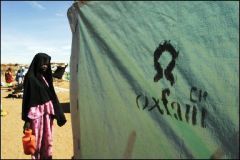Over 300 people share a single water tap in South Sudan: Oxfam
March 2, 2024 (RENK) – The influx of over half a million people fleeing Sudan’s conflict meant that transit centres in Renk, a town bordering Sudan are swelling with more than 300 people sharing one water tap, Oxfam said in statement.
The lack of clean water and sanitation is increasing the risk of cholera, it warned.
According to the aid agency, more than 15,000 people are currently staying at two centres in Renk designed to host only 4,750 people, further stressing that up to 5000 more are living in the open without any clean water or proper hygiene.
Even prior to the recent conflict, there were 1,027 cases of cholera in South Sudan.
Also noted with concern are increased cases of diseases due to poor sanitation.
Currently, Oxfam said in a statement extended to Sudan Tribune, more than 100 people are using just a single latrine, more than double the minimum standard.
“I just came back from Renk where people are crammed in shelters in horrifying conditions. Many have to queue for hours just to use clean water or a toilet. Without an immediate injection of funds, the situation will explode into a full-blown catastrophe, leaving many more people at risk of diseases and going hungry. The upcoming rainy season in April will cut off major roads hampering vital aid and further limiting people’s transportation to shelters,” said Oxfam in South Sudan Country Director, Dr. Manenji Mangundu.
Over 80% of the population in South Sudan – four out of five people are already in urgent need of humanitarian assistance, the aid agency said, stressing that overlapping crises including five years of floods and conflicts in some parts of the country have already devastated the lives and livelihoods of millions of people.
“The hunger is unbearable*. *My children eat only once a day if they are lucky. Their meal is a small bowl of lentils for the entire day, as I watch them suffer from malnutrition. I need to walk deep into the forest for firewood, facing multiple hazards such as snakes and the risk of being attacked. If I’m lucky I sell firewood to buy little food and if not, we sleep hungry and in the open leading to diseases and insecurity,” said Bibiana Peter, a mother of five who was forced to flee Sudan.
The upcoming lean season (April to July 2024) will force food stocks to hit their lowest level, compounding the already dire situation for the host community.
Over 7 million people in South Sudan face extreme hunger, including 79,000 facing catastrophic levels of hunger, aid agencies say. This number has increased by 22% while people experiencing catastrophic hunger has more than doubled.
Despite a surge in the number of people fleeing the conflict in Sudan, and the worsening humanitarian catastrophe, funding has dwindled to an unprecedented low.
The UN appeal for South Sudan in 2023 has been slashed by half compared to previous years.
Since the beginning of this year, less than 4% of $1.79 billion UN appeal has been raised, amid concerns this low level of funding has severely curtailed humanitarian efforts.
“With major global crises attracting attention, the crisis in South Sudan is forgotten. But the world must not turn a blind eye. We are racing against time but funding cuts at this time are stretching our capacity to the limit and are a recipe for disaster. Every day of delayed action means irreversible harm to a population that already suffered years of devastation and destitution,” stressed Manenji.
Oxfam and partners has provided clean water and proper sanitation to over 70,000 people in the transit camps, but urgently needs $7 million to ramp up its operations and reach 400,000 people with lifesaving food, clean water, and sanitation.
(ST)

